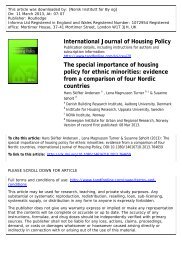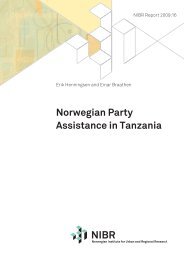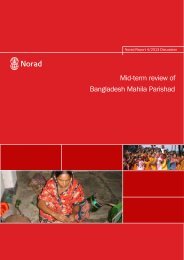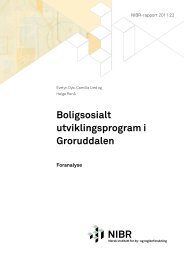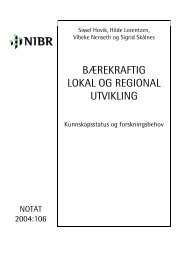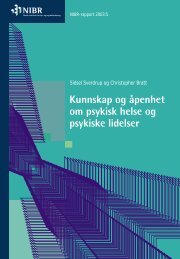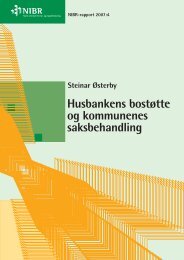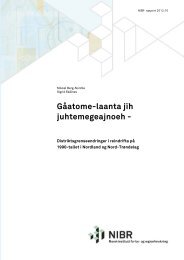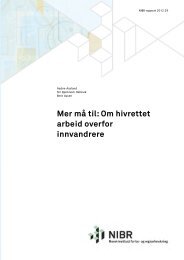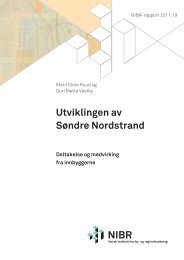Evaluation of the Southern and Eastern Africa Regional Centre for ...
Evaluation of the Southern and Eastern Africa Regional Centre for ...
Evaluation of the Southern and Eastern Africa Regional Centre for ...
- No tags were found...
You also want an ePaper? Increase the reach of your titles
YUMPU automatically turns print PDFs into web optimized ePapers that Google loves.
60Annex 3:Zambia Field WorkOne <strong>of</strong> <strong>the</strong> members <strong>of</strong> <strong>the</strong> evaluation team, Hellevik, undertook <strong>the</strong> case study inZambia. Zambia has 25 graduates from <strong>the</strong> SEARCWL. There are more non-lawyersthan lawyers coming from Zambia, with 7 lawyers <strong>and</strong> 16 non-lawyers. In addition,<strong>the</strong>re are two upgraders where no status has been able to retrieve. 9 <strong>of</strong> <strong>the</strong> graduateswere police <strong>of</strong>ficers when <strong>the</strong>y undertook <strong>the</strong> masters. Except <strong>for</strong> two <strong>of</strong> <strong>the</strong> o<strong>the</strong>rgraduates who worked in <strong>the</strong> NGO <strong>and</strong> INGO sector, <strong>the</strong> o<strong>the</strong>r graduates worked invarious positions within <strong>the</strong> government, some on legal work, such as one being alegal practitioner, ano<strong>the</strong>r working as a legal <strong>of</strong>ficer <strong>and</strong> a third being a divisionalprosecutions <strong>of</strong>ficer. However, compared to Zimbabwe, it is striking that <strong>the</strong>re havebeen no graduates from Zambia coming from <strong>the</strong> magistrates’ court or from <strong>the</strong>Ministry <strong>of</strong> Justice directly (but from underlying organisations, such as from <strong>the</strong>Zambia Law Development Commission <strong>and</strong> from <strong>the</strong> divisional prosecutions <strong>of</strong>fice).The male participation from Zambia is higher than <strong>the</strong> female participation: 15 <strong>of</strong> <strong>the</strong>graduates are male, 10 are women. In <strong>the</strong> focus group that was held in Lusaka allparticipants were male.In Zambia, both graduates working in Lusaka <strong>and</strong> some outside were interviewed tosee whe<strong>the</strong>r <strong>the</strong>re was any difference in terms <strong>of</strong> <strong>the</strong>ir involvement on women’s lawissues after having graduated. There was not such a substantial difference as <strong>the</strong> oneswho were stationed outside Lusaka primarily worked in <strong>the</strong> police <strong>and</strong> worked onissues relate to women <strong>and</strong> children.Moreover, two employers <strong>of</strong> graduates in <strong>the</strong> police were interviewed <strong>and</strong> some keyin<strong>for</strong>mants, among <strong>the</strong>m two female judges - one working in <strong>the</strong> Supreme Court <strong>the</strong>o<strong>the</strong>r working in <strong>the</strong> high court. The one working in <strong>the</strong> Supreme Court happened tobe a graduate <strong>of</strong> <strong>the</strong> women’s law diploma at University <strong>of</strong> Oslo from 1988. Inaddition, some key in<strong>for</strong>mants were from in organisations under Ministry <strong>of</strong> Justice,such as <strong>the</strong> deputy director <strong>of</strong> <strong>the</strong> law development commission <strong>and</strong> one from <strong>the</strong>NGO WLSA Zambia. In Zambia, <strong>the</strong> composition <strong>of</strong> graduates in terms <strong>of</strong> <strong>the</strong>irwork places <strong>and</strong> pr<strong>of</strong>essional background is different from Zimbabwe. Several <strong>of</strong> <strong>the</strong>graduates have come from <strong>the</strong> police <strong>and</strong> have a non-lawyers background.Some <strong>of</strong> <strong>the</strong> graduates work in organisations which are organisationally placed under<strong>the</strong> Ministry <strong>of</strong> Justice, such as <strong>the</strong> Law Development Commission, while o<strong>the</strong>rswork in organisations associated with law practice, such as two graduates in <strong>the</strong>national legal aid clinics (In Lusaka <strong>and</strong> <strong>the</strong> central province). The national legal aidclinic is under <strong>the</strong> Law Association <strong>of</strong> Zambia <strong>and</strong> reports to <strong>the</strong> women’scommittee in <strong>the</strong> Law association <strong>of</strong> Zambia. The reason <strong>for</strong> <strong>the</strong> lack <strong>of</strong> recruitmentfrom magistrates <strong>and</strong> ministry <strong>of</strong> justice are likely to be <strong>the</strong> self-recruitment among



